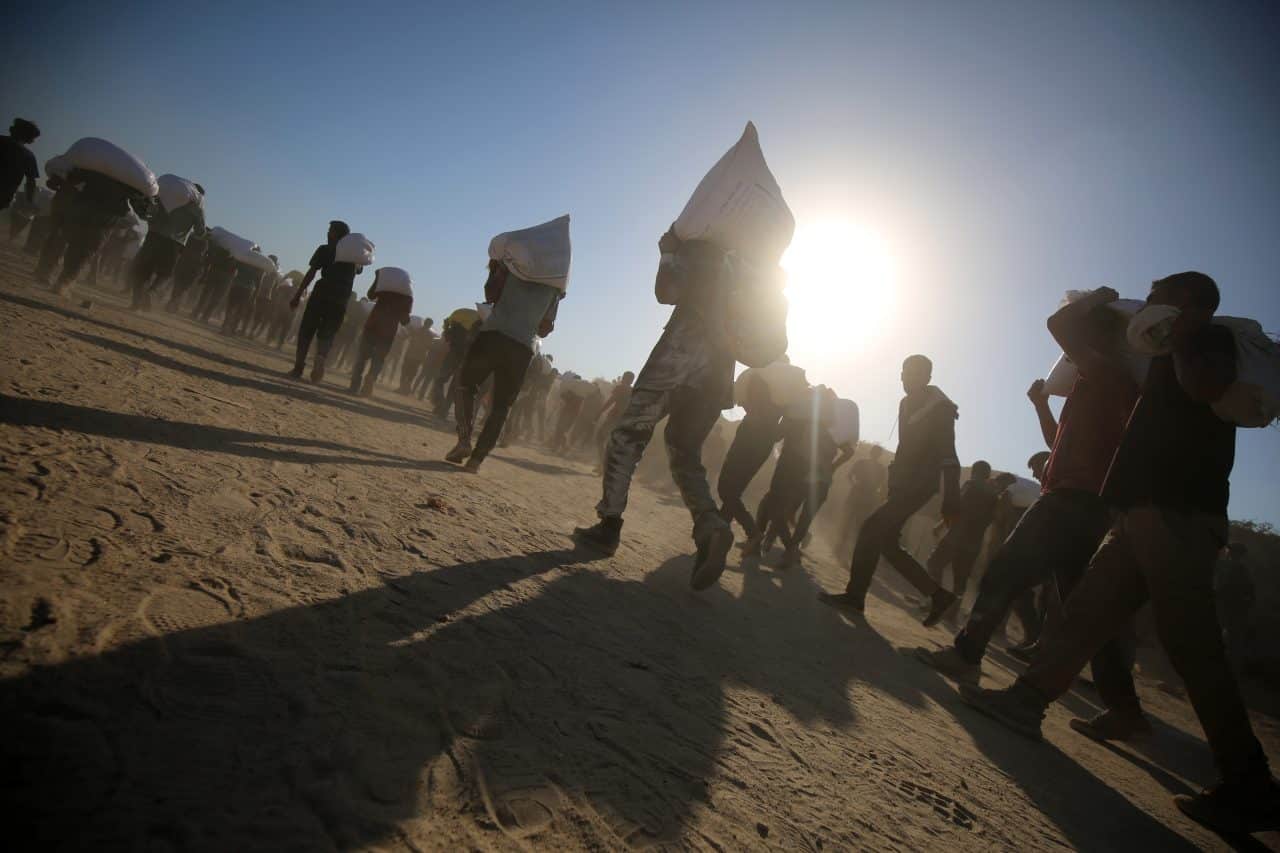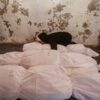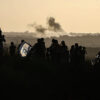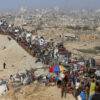Israeli forces opened fire on starving Palestinians waiting for food in the Sudaniyya neighborhood, just outside the Zikim border crossing in north Gaza, on July 25.
“This is the first time that my brothers have gone there to search for flour. Their phones are shut down,” Malek Shinbari, a displaced Palestinian in the Mawasi area of Khan Younis, wrote on his Facebook page on that day. “There’s news of a new massacre. I am burning inside, and I don’t know what to do.”
Twenty-one months, two weeks, and four days before his Facebook post, Malek was, among other things, a husband, a father to a three-year-old girl and another one on the way, and an architectural graduate from the Islamic University of Gaza.
Malek and his family lived in an apartment in a residential building in Gaza City’s Tal al-Hawa, the neighborhood where most young, educated Palestinians, lucky enough to work for a foreign company, wanted to move. There, a millennial middle class, eroded by years of blockade and devastation, took shape.
In the first week of Israel’s genocidal war on Gaza following October 7, Malek and his family packed a few of their things and left under the evacuation orders of the Israeli army, moving south. They escaped Israeli bombs from Deir al-Balah, to Rafah, to Khan Younis, before ending up in al-Mawasi’s crowded tent encampments.
In January of this year, Malek and his family had their first opportunity to rest in months. The ceasefire between Israel and Hamas gave Palestinians two months of relative calm, during which Israel allowed humanitarian aid into Gaza in larger quantities. Prices of food in Gaza dropped, even though they never returned to their pre-war levels.
On March 18, Israel broke the ceasefire and killed 400 people throughout the first ten minutes of resuming its bombing campaign. Simultaneously, Israel completely closed all border crossings and blocked the entry of food, fuel, and medical supplies. Items began to disappear from the market as prices skyrocketed and malnutrition began to spread again. I started speaking to Malek regularly, who sent me regular updates on his attempts to survive Israel’s ongoing starvation policy in Gaza.
May 6
A month and a half into the renewed blockade, starvation became widespread.
Malek told me prices have exploded in the Gaza Strip. “A sack of flour costs 2,500 shekels today [$740], if you find it. Bread has become a luxury.” When I asked him how people are managing the situation, he described the adaptation of Gazans to the lack of food more accurately than the reports of the World Food Program. “Nobody is managing anything. If you find food, any food, you eat that day, and if you don’t, you stay hungry.”
“We are grinding rice and pasta to make flour,” he told me. “A bag of rice costs 40 shekels [$12],” he said, explaining that the price used to be 8 shekels before the war, or about $2.50. “It’s still much more affordable than flour, but many people don’t even have a single shekel, let alone 40. So they go to the remaining charity kitchens hoping to find lentils or leftover soup powder. But most of those have been looted by gangs.”
“It’s humiliating there,” Malek said, describing the scene at the charity kitchens, most of which were bombed by the Israeli army or ran out of food in subsequent months. “Hours of waiting in a line in the sun, a whole day just to get a bowl of soup. But for many people, it’s the only chance they get to put something in their mouths.”
May 9
Malek told me about how his children have amoeba on top of the malnutrition. He tools his 4-year-old daughter, Ayloul, and his son Zain, now 1, to Nasser hospital, the only medical center in Khan Younis that is still operational. “Ayloul’s case was advanced, but Zain was diagnosed early on,” he explained. “The problem is, there’s no medicine, so we have to rely on alternatives.”
Zain was born in the spring of 2024 in Mawasi. He took his first steps between the tents, and the first time he was in a real building — when they went to the hospital — he was confused by the hardness of the wall. He had never seen one.
June 20
The weight of the blockade had begun to weigh the heaviest on the young. Baby formula and powdered milk ran out at the markets and became exceedingly rare.
“For a whole month, I could only buy two little packs of milk for Zain after a lot of hardship and asking for help,” Malek said in a text. The same day, Malek talked about how he had to walk one and a half miles to get two gallons of drinking water. “For washing our clothes and other uses, we depend on seawater and a few water wells whose owners allow us to make use of, in exchange for 120 shekels per cubic meter of water.”
Earlier that month, the World Food Program reported that as of June 10, 700 trucks of aid had been delivered through Kerem Shalom. “This compares to 600-700 trucks of aid transported per day during the ceasefire earlier this year,” the WFP stated. “The trucks carried over 11,000 metric tons of food, but only 6,000 metric tons entered Gaza — enough to support less than 300,000 people for a month with minimal daily food requirements. This is a small fraction of what is needed for a population of 2.1 million people and far too slow to meet the overwhelming needs.”
Simultaneously, the UN warned that people are forced to choose between risking one’s life and feeding one’s family,” in reference to the killing of Palestinians by Israeli fire at the Gaza Humanitarian Foundation (GHF) distribution centers.
June 22
Malek describes a daily scene of the famine. “The pain in my heart grows, and helplessness eats away at me every time I see — or someone asks me about — something as simple as a shekel, a loaf of bread, or a bite of food. But I never imagined, not once, that I’d hear such a strange request from a child. I saw her walking, the sun scorching what remained of her childhood, carrying an empty water jug as if searching for something. I asked her, ‘What are you looking for?’ And she replied, with all the eloquence Arabic can offer: ‘A cup of water, please.’ Has it really come to this?”
July 13
Malek fainted from hunger while looking for food for his family that same month.
“Today, my body betrayed me while in the market. I fell on the ground and lost consciousness until an elderly couple put some sugar in my mouth and a leaf of mint on my nose,” Malek wrote. “I’ve seen many people fainting lately, but never expected to be one of them. I thought I was way stronger than hunger. I suppose some thoughts can be deceiving.”
In July, the starvation reached new levels. The AFP journalists’ union published a statement saying their colleagues in Gaza were fainting from hunger. “We have lost journalists in conflicts, we have had wounded and imprisoned in our ranks, but none of us remembers seeing a colleague die of hunger,” the statement read.
July 15
Sugar has become one of the most precious items in Gaza, so rare that Palestinians are using whatever substitute they can find, even without knowing what it is.
Malek told me about how Palestinians are now risking their children’s health just to quiet their hunger. “I went to a place where a friend told me that they sold ‘sweetened water,’” he said. “I don’t know what substance they use to sweeten it. A liter of it is sold for only ten shekels. A mother wanted to fill her child’s feeding bottle, explaining that she couldn’t afford a packet of formula for 150 shekels [$44]. So she just feeds the child sweetened water, tricking him into thinking that it’s milk, until he falls asleep. And when he wakes up crying, she feeds him sweetened water again.”
July 19
The hardest part of it all is watching what starvation is doing to your children, Malek wrote me.
“I envy them all, those who were lucky to die at the beginning of this genocide,” Malek said in a text. “I envy those who died before the famine. I envy those whose elderly father died before having to look for sugar, and whose baby died before looking for milk.”
That same day, Malek told me he would rather die than hear Zain or Ayloul ask him for food again. “I can count my ribs now,” he also said.
July 23
The starvation is reaching a new phase now. Malek describes experiencing something different from before, something that “nobody but us can understand.”
“We can’t explain it because we can’t see it,” he explains. “Healing from a mosquito bite can take days. Seeing people fainting in the streets is normal. Being only a little dizzy is a luxury.”
By that point in time, the only way for Palestinians to access food was at the GHF distribution centers, where people going there would risk their lives to bring home a bag of flour. Well over 1,000 Palestinians had been killed at those centers, widely described as death traps. Malek had been refusing to go to those centers, relying on buying whatever food he could find at the market, which was becoming increasingly more expensive. But for many Palestinians, there is no other choice. Malek’s brothers, in another area of the Gaza Strip, are among them.
“My mother called me three hours ago to tell me that both my brothers left to wait for aid in the Sudaniyya area north of Gaza. They haven’t been back,” he wrote me. “They had told my mother not to tell me that they were going, because they knew that I would do the impossible to prevent them from going. Their phones are shut down, and I am burning inside. I don’t know what to do.”
Hours later, I asked Malek about his brothers. “They came back, no flour. Wounded, but alive.” They survived, but the joy of their survival didn’t wash away their ongoing agony.
The clock marked 24 minutes past midnight. Israeli helicopters roamed over the east of Ramallah, where my hometown is located. The sound of the helicopters reminded the villages of the area that, despite the tense calm in their surrounding hills, there is a war. I felt hungry and remembered there was some fruit in the kitchen. Then, looking at my screen, I knew what Malek was thinking while looking at his screen, under the sound of the same helicopters in Mawasi.
I messaged Malek and asked him how he was doing. “I’m mostly tired of expecting the world to end this,” he says. Then he adds, “I need to sleep. I have to wake up early to go look for food.”
By Qassam Muaddi
Source: Mondoweiss








